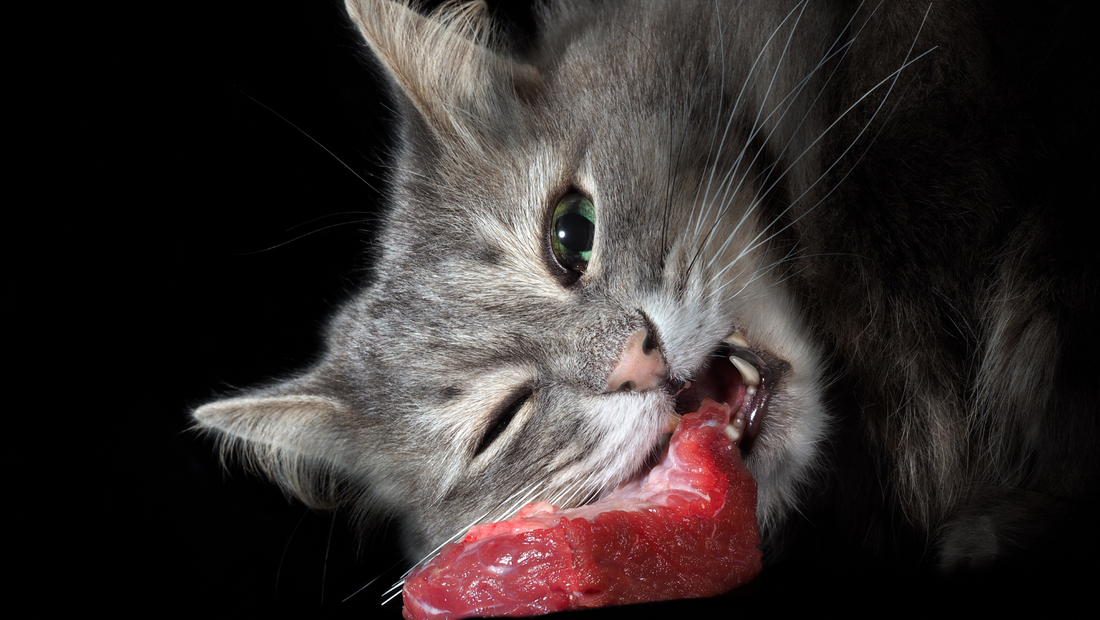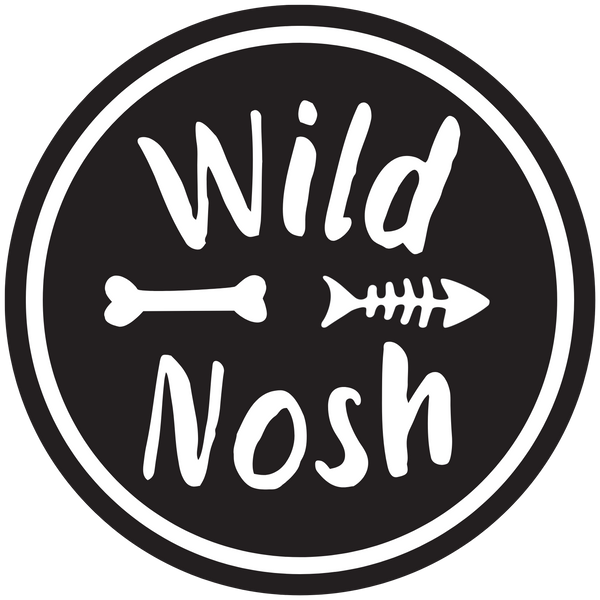
Keeping Carnivores as Companions: An Environmental Dilemma?
We love our carnivorous companions, but for the conscious consumer who’s concerned about the health of the planet and the welfare of animals, feeding them can turn into an ethical conundrum. That’s because dogs and cats are responsible for 20-35% of the United States environmental impact from meat consumption, generating 64 million tons of carbon dioxide annually. In fact, if our dogs and cats were their own country, they’d rank 5th highest in meat consumption globally, falling only behind Russia, Brazil, The United States, and China.
Although vegan and vegetarian dog foods and treats are available, most experts agree that dogs are healthier on a species-appropriate, meat-based diet. Eating meat is even more vital for cats and we discourage ever putting a cat on a vegetarian/vegan diet as the likelihood of chronic illness increases dramatically. This is because, despite thousands of years of domestication, dogs are still biologically, domesticated wolves, and cats are nearly indistinguishable from their African wildcat ancestors. As carnivores, there are a host of essential vitamins and minerals that dogs and cats can only acquire from meat.
If you’re one of the 90% of pet owners feeding your pet kibble, this may not seem like much of a dilemma, however, even the best kibble has devastating consequences for livestock animals, the environment, and the health of our pets.
The Problems With Kibble
Kibble was designed as a cost-effective, convenient method to make use of byproducts from the human food supply chain that would otherwise go to waste. Kibble is typically mass-produced in factories; often with multiple brands being manufactured at the same location with nearly identical ingredients. The big pet food manufacturers then market these burnt balls of grain and meat byproducts as a wholesome, complete diet.
Mass-produced products are inherently problematic when animal welfare and ethical sourcing are not involved, and it’s almost impossible to guarantee that the millions of farm animals turned into kibble were treated ethically and humanely. Rather, consumers are assured that ingredients are “responsibly sourced” or “farm-raised,” which are vague labels that don’t actually mean much given the lack of standardization of these terms.
Beyond the impact on farm animals' lives, mass-produced pet food has a negative environmental impact. A 2017 study estimated that dog and cat food is responsible for up to 30% of the environmental degradation caused by animal agriculture. Additionally, it is important to consider the environmental toll of manufacturing, packaging, and transporting the 9.4 million tons of pet kibble produced in the U.S. each year. The food we select for our beloved companion animals can have a much larger carbon footprint than we ever could have imagined.
Above all, kibble just isn’t a very healthy choice for pets. Most of us would be shocked if our doctors encouraged us to eat a diet consisting strictly of a single, highly processed food. And we’d be even more skeptical if the doctors were selling it. Yet this is what we’ve grown to accept as healthy and acceptable for our pets; often without a second thought. Processed pet foods have been recalled hundreds of times due to deadly aflatoxins, mold, salmonella, foreign objects, and insufficient vitamins and minerals. Because of its high carbohydrate content, low moisture, and low-quality ingredients, kibble has also been linked to obesity, diabetes, kidney disease, urinary issues, and periodontal disease.
If kibble is so bad, why does my vet sell it?
While all vets take some nutrition courses, the reality is that, unlike human doctors, vets have to learn about a wide variety of conditions and ailments that can impact a range of different breeds and species. Nutrition is just a small blip in their academic career, and depending on who you ask, it may be a biased one. For example, Hill’s recently donated more than two million dollars to renovate Kansas State University’s School of Veterinary Medicine and in 2022 Texas Tech Vet School celebrated the opening of the Purina Nutrition Center. Veterinary students and faculty at UC Davis are eligible for substantial discounts on Purina, Hills, and Royal Canin as part of their Student American Veterinary Association Pet Food Program, and The American Animal Hospital Association’s continuing education certificate is sponsored by Purina. Add to this that Mars Pet Care, who manufactures Royal Canin, also is the largest owner of veterinary clinics in the United States. They own more than 2,500 vet clinics, including all Banfield, VCA, and Blue Pearl hospitals.
What should conscious consumers feed their pets?
While the question of what to feed your pet may seem complicated based on the above information, the solution is surprisingly simple: fresh foods from small companies that emphasize transparency. The idea of handling fresh meat may make many vegetarians squeamish. Still, the benefits for the planet, farm animals, and our pets far outweigh any personal misgivings that may come from having meat in the kitchen. When it comes to food, we recommend visiting your local, independently-owned pet food store. Talk to the staff, and then do your own research and make an informed decision. If you’re ever in Lafayette, CO we definitely recommend you stop in our sister store, The Happy Beast, to say hello!
What about treats?
When it comes to treats, our philosophy is the same, and we have you covered! We created Wild Nosh specifically with the dilemma of ethical pet ownership in mind. Treats are supposed to be fun and rewarding, but there’s nothing fun about cat treats full of ingredients that cats can’t digest, dog chews that contribute to deforestation, or jerky bites that leave orangutans homeless. Even after finding a treat that meets our criteria for ingredient quality, there’s the packaging to consider, more than 300 millions pounds of plastic waste are produced for pet food and treats in the United States each year, all of it difficult or impossible to recycle. Even the single ingredient, all natural, USA raised treats like pig ears or chicken feet are subject to the statistic that 99% of farm animals are raised in factory farm conditions. With Wild Nosh treats we’ve done the digging so that you don’t have to. All of our treats are biologically appropriate for both dogs and cats, and are transparently sourced from farms that we feel good about. Beyond ethically sourced, we’re focusing on treats made with skins, organs, and other by-products of the human meat industry, minimizing the environmental impact of our furry friends meat consumption. Our carp treats are helping clear destructive non-native fish from important waterways, and we’re experimenting with more treats made with invasive species. Best of all? Our treats are entirely plastic free, and we offer carbon-neutral shipping directly to your home!
